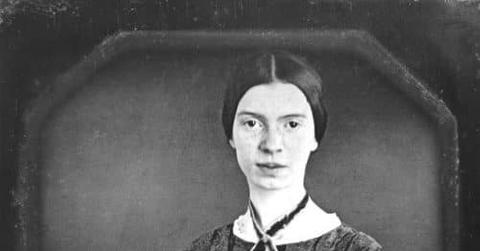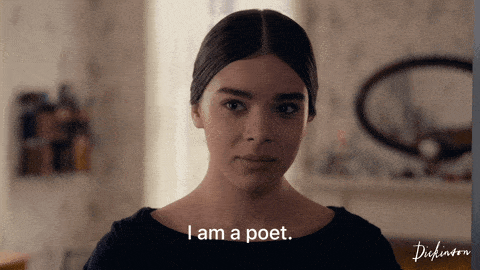Remembering Emily Dickinson On Her Birthday, The Poet Penned 800 Poems By Age 35
Born 190 years ago today, Emily Dickinson’s poems and letters are still being analyzed in high school and college literature classes. Even after her death, her work has such lasting impact that biographical movies have been released about the story of her life.
Emily Dickinson was born December 10th, 1830 in Amherst, Massachusetts. She was granddaughter to Samuel Dickinson, the founder of Amherst College. Her father, Edward Dickinson, served as a state legislator. Though Dickinson grew up surrounded by influential people, she was reclusive. She wrote most of her work alone at her family’s homestead.
Dickinson started writing during her teen years. Her early work was influenced by her principal at Amherst College (then known as Amherst Academy). Dickinson’s poems focused on love, pain, nature, and suffering. She made her readers think deeply about the meaning of life. Emily Dickinson’s words took readers on a roller coaster of emotions. She made them think about the implicit meanings hidden within the lines of her writing. By the time Dickinson was 35 she had produced about 800 poems.
Dickinson lived her life on her terms. Writing became a way to express how she felt. Many readers never really knew what Dickinson was going through, but that was the point of her writing. Dickinson wanted to make sure that her readers brought their own interpretations to her words.
Though she wrote many poems during her lifetime, she was not officially recognized until after her death. Emily Dickinson died from heart failure at the age of 55 in her hometown. Though she died young, Dickinson’s voice remains powerful through her many inspiring quotes.
Here are 5 iconic quotes from Emily Dickinson:
1. “Unable are the loved to die, for love is immortality.”
This quote is from Emily Dickinson’s poem “Unable Are The Loved to Die,” during these circumstances diseases such as scarlet fever and smallpox were running rampant. Thousands of people lost their families to these diseases. Grief made people forget that even though their loved ones were physically gone, they were not really dead; love kept them alive. This quote was offered as comfort to a society that was in pain.
2. “Find ecstasy in life; the mere sense of living is joy enough.”
The 1800s were tough times to live in. With minimum technology, there was little to distract people from death and disease. Emily Dickinson found joy through writing poems and letters. Dickinson suffered from vision problems, but that did not deter her from pursuing her joy. After receiving treatment, she would only write in dim light. Emily Dickinson was able to find joy within the limited boundaries of her life. Dickinson didn’t look for joy through socializing and buying material things.
3. “Truth is so rare that it is delightful to tell it.”
Dickinson’s writing talked about her life and how she perceived the world. She didn’t sugarcoat how real and dangerous the world was. Her mentor, Thomas Higgins discouraged Dickinson from publishing her work. He felt the world was not prepared for Dickinson’s type of truth-telling.
4. “Fame is a fickle food upon a shifting plate.”
This quote is from Emily Dickinson’s poem “Fame is a fickle food”. Dickinson did not give permission for her poems to be published. She didn’t want exposure, and chose to remain reclusive. The words suggest that she didn’t trust the fame that could result from becoming well known.
5. “To live is so startling it leaves little time for anything else.”
Writing and family were the two most important things in Emily Dickinson’s life. Even though Dickinson lived a quiet life, it was still full and rewarding. Dickinson didn’t need to be an extrovert to make her life feel complete.







